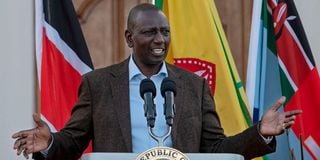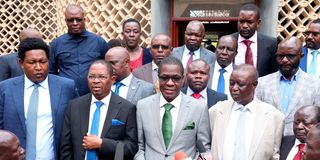Premium
Making of economic meltdown: Kenyans brace for tough times

President William Ruto speaks during a press conference at State House, in Nairobi, on April 2, 2023. Mid this week, President Ruto said the country would not borrow to pay workers’ salaries.
In about six months, the first round of payments for our monthly fuel imports will fall due, draining an estimated $3.6 billion, or nearly half a trillion shillings from the economy.
At about the same time, another round of multibillion-shilling loans similar to the ones that caused the delay of public servants’ March salaries will fall due for payment.
As President William Ruto’s top economic adviser David Ndii recently said, Treasury Cabinet Secretary Njuguna Ndung’u will have to make a choice between delaying civil servants’ pay yet again or defaulting on public debt.
Multibillion-shilling loan maturities, below-target tax collections, an outsized public wage bill and a depreciating shilling have formed a perfect storm that now batters the economy.
The Kenyan economy is in distress, with the government gasping for air in its attempt to meet ever-rising obligations.

Council of Governors chairperson Anne Waiguru flanked by some of the governors. County governments have warned that public services, including health, will stall if no money is remitted from the National Treasury.
It will require deft economic management and fiscal discipline to dig Kenya out of the financial hole.
“Counties are in danger. We risk grinding to a halt. We have not received money since December. I understand there is a financial constraint but we urge the National Treasury to know that counties also have workers,” Council of Governors chairperson Anne Waiguru said on Friday.
She added that no devolved government has received allocations for January, February and March, with workers going without pay for two months.
Owed Sh125bn
Counties are owed Sh125 billion in allocations for January to March.
This is the longest period devolved governments have gone without receiving the equitable revenue share from the National Treasury.
Mid this week, President Ruto said the country would not borrow to pay workers’ salaries.
The University of Nairobi Economics don, XN Iraki, says the government has to take bold decisions to arrest the situation that has the potential of snowballing into an economic meltdown.
He says the government has to put in place austerity measures and collect more taxes. Prof Iraki sees few options apart from more borrowing.
“The situation is because of a confluence of many factors – internal and external. Drought, Covid-19, political transition, the Ukraine war and a strong dollar have contributed to what is happening,” Prof Iraki said.
“Bold decisions must be taken, including austerity and more taxes despite depressing growth and unbelievably more borrowing. Lastly, political stability brings economic confidence.”

Dr David Ndii, President William Ruto’s economic advisor. Dr Ndii said Treasury Cabinet Secretary Njuguna Ndung’u will have to make a choice between delaying civil servants’ pay yet again or defaulting on public debt.
Data by the Treasury released on Thursday shows Kenya Revenue Authority (KRA) is struggling to meet its targets. The taxman is required to collect Sh714 billion in three months to meet the Sh2.1 trillion target for the fiscal year that ends in June.
This figure means that KRA has to collect about Sh7.9 billion daily, a near impossibility.
Reform tax policies
Mr Ken Gichinga, the chief economist at Mentoria Economics, says the country needs to reform its tax policies as part of efforts to address the crisis.
He says the 17 per cent tax revenue collection as a percentage of GDP is very low compared to a country like Denmark, which is at 34 per cent.
“Kenya has never had a comprehensive tax policy and this increasingly complicates our fiscal policy. The country needs to adopt more progressive policies for it to have sufficient revenues,” Mr Gichinga says.
“We are entering a new epoch which demands we apply new thinking to our fiscal and monetary policies, as well as embracing technology and innovation. Policymakers have to abandon traditional policies in favour of new insights backed by quality research.”
The shilling continues to take a beating against the dollar, implying that the country will be spending more in servicing foreign loans.
The Ruto administration’s plan of dealing with monthly oil imports through government-to-government credit also means the economy will face a lumpsum demand for dollars every six months.

Council of Governors chairperson Anne Waiguru flanked by some of the governors. County governments have warned that public services, including health, will stall if no money is remitted from the National Treasury.
Oil import averages $600 million a month, meaning about $3.6 billion would be needed every six months unless Treasury negotiates yet again to prolong the credit.
A Sh250 billion Eurobond maturing in July 2024 will also test the strength of the economy to the limit.
The opposition Azimio la Umoja One Kenya coalition says it is clear KRA will not meet its targets.
The alliance blames the shortfall on the recent restructuring at the authority instigated by chairman Anthony Mwaura, which it claims has affected employees’ morale.
Political vendetta
The opposition says the changes were based on political vendetta.
“The revenue shortfall is not realistically achievable in the remaining two months,” National Assembly Minority Leader Opiyo Wandayi said.
The government has consistently blamed the crisis on heavy borrowing by former President Uhuru Kenyatta’s regime.
According to public finance data, Treasury is paying Sh1.4 trillion loans in the 2022/23 financial year. Of the figure, Sh800 billion is principal and the remaining is interest.

Azimio legislators led by National Assembly Minority Leader Opiyo Wandayi address the media at Parliament Buildings on March 22, 2023. Mr Wandayi has said the revenue shortfall is not realistically achievable in the remaining two months.
President Ruto is said to have deemed this a dire and unsustainable state of affairs and consequently brought to an end expensive short-term commercial loans.
The current regime also reduced the budget deficit of Sh900 billion by Sh300 billion as part of austerity measures.
The government says from the local bond market, Treasury is now borrowing at 10 per cent down from as high as 14 per cent.
Dr Ndii, who chairs President Ruto’s Council of Economic Advisers, recently said the government has stabilised the exchange rate to the dollar.
“You build on these things. When we came in, we had a huge challenge with dollars. We have stabilised the dollar and established an inter-bank market that should be working by the end of this month,” he said.
The shilling was exchanging at 133.8 per dollar yesterday.
Though prices of basic commodities like maize flour have remained high, the government says it has brought down the cost of living.
“I am aware of the cost of living matter. We agreed to address the problem of flour. The most sustainable way of addressing the cost of maize flour is to address the cost of farm inputs. I have already registered five million farmers and offered them six million bags of affordable fertiliser,” the President said on Friday.
“As we wait for the maize in farms, I have made plans to import. The imported maize will be in the country by tomorrow. Starting next week, the cost of flour will fall.”
ODM deputy leader, Wycliffe Oparanya, says the cost of flour can only go down if the government introduces subsidies.
“I hear the maize they are importing is yellow. Unless the supply side of the economy is sorted, nothing is likely to improve,” he said.
“Kenya is in an economic depression. You walk to a supermarket and realise people have no money for basic items.”
The government says it seeks to bridge the 10 million bag deficit through imports, with 1.4 million tonnes of maize expected soon.




